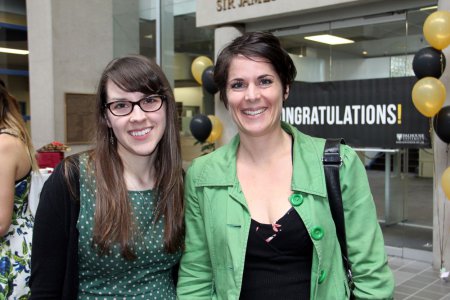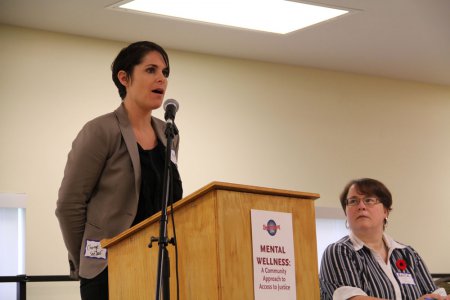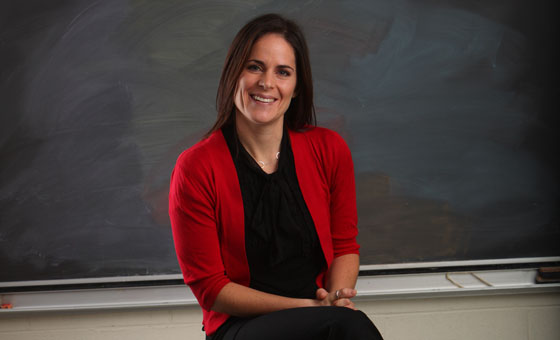
Emma Halpern (LLB’06): The equity-builder
By Mark Campbell
Every time Emma Halpern (LLB’06) makes a decision, she asks herself how it will contribute to making the world better in some small way.
“That takes some thinking and work,” the Dalhousie Law School alumna acknowledges, “to always ensure that I’m not making choices just for my own interest, or because I’m scared, or might upset someone. I do it because I have a desire to bring about a more inclusive and equitable society.”
It’s a commitment Halpern has maintained virtually all her life. As a teen, she launched a gender equity committee at her Vancouver high school. She has worked at women’s shelters in Serbia and Guatemala, with a community group in Harlem, and in Ghana on an agricultural project. She led the way in introducing restorative justice to Nova Scotia’s schools. And she continues to address issues of diversity and discrimination in her current role as Equity Officer at the Nova Scotia Barristers’ Society, often in collaboration with Dalhousie.
“I feel supported and encouraged by my alma mater. The work that I do on access to justice just wouldn’t be possible without the help of Dalhousie’s students, faculty and the Dalhousie Legal Aid Clinic.”
 A sense of purpose and pride
A sense of purpose and pride
Halpern says she never saw herself going into law. In fact, as a youth, there were times she didn’t see much of a future for herself at all, in part due to abusive relationships. Yet it was those negative experiences, and the mentors in her life, that compelled her to find a positive outlet for her anger and frustration. “I saw that I could channel some of it to bring about social change and when I did, it gave me a sense of purpose and pride.”
That realization led her to board a plane for Central America when she was just 18. She travelled on her own, not knowing anyone or the language, eventually making her way to Guatemala where she volunteered at a women’s shelter. She says she never much thought of the potential risk involved; instead, she saw an opportunity to learn and help out in a country emerging from a horrific civil war.
“I think fear really propagates a lot of negativity in our society. It stops us from doing the right things. I made a pact to always challenge that sense of fear in myself because it never outweighs the value of doing work that matters.”
Her path to Dalhousie
Halpern continued her travels, which led her to McGill to study International Development and English, to Africa for the agricultural project and back to Central America. Yet it was an impromptu decision to visit her brothers in New York – inspired by a delayed return flight to Canada from Central America – that set her on the path to Dalhousie. While staying in the Big Apple, she started volunteering with a community organization in Harlem called Action for Community Empowerment and, thanks to a temporary visa, she was hired as an employee.
“We did youth community organizing and political activism, so I was able to draw on my own experiences to inspire young people there. But I gradually began to realize that, if I really wanted to effect change, I needed to be part of the conversations that were happening among the real power brokers in this world. That’s when I decided to come back to Canada and earn my degree at Dalhousie.”
An interest in restorative justice takes root
Halpern was drawn to the university in part by the law school’s Indigenous Black and Mi’kmaq Initiative, which illustrated a commitment to diversity. Yet it was her work with the university’s Legal Aid Clinic that was a life-changing experience. “The lawyers there showed me how you could bring social justice into practice, which wasn’t always clear in class. That was the moment I realized the work I do truly matters.”
Dalhousie also sowed the seeds for Halpen’s interest in restorative justice. She took a course on the subject from Professor Jennifer Llewellyn, volunteered with the Community Justice Society and wrote a paper on bringing a restorative justice approach to school discipline. Excited by the prospect of introducing such a program in the province, she began looking into opportunities while articling with Nova Scotia Legal Aid in Yarmouth.
“Jennifer had done a fantastic job teaching us the way restorative justice principles can impact our lives. I called her, told her what I wanted to do and she encouraged me to reach out to the local restorative justice agency, which led to a pilot project in one school in 2007.”
That project, Bringing Restorative Justice Into Schools, has since expanded throughout the province, thanks in part to Halpern’s dedication. Over the years, it has led to a significant reduction in office referrals, more positive relationships between students, staff and parents, and increased student success.
“At one point, we had a statistic that there had been an 80 per cent reduction in discipline issues,” says Halpern, who remains involved with the initiative as a consultant. “I remember one parent told us ‘I don’t know what you did with my son, but he went to school angry and came home a different boy.'”
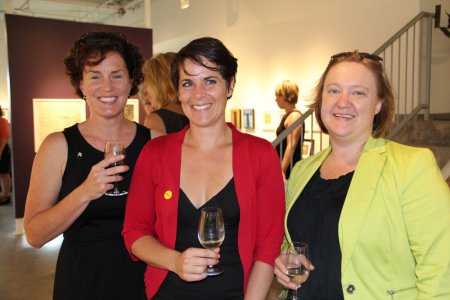
Halpern at a Pride event with President of NSBS, Jill Perry and President of the CBA, Amy Sakalauskas.
As Halpern sees it, such changes can only happen when people come together to address issues, which is why she’s excited about the work she’s been doing with the Barristers Society. Through various initiatives and events, she’s gathered lawyers, judges, police and community members to talk about access to the justice system. Her efforts have been recognized with several honours and awards, including the Canadian Bar Association’s 2013 Sexual Orientation and Gender Identity Conference Ally Award for her support of LGBTT communities in Canada.
It isn’t easy bringing about change in such a long-established system, yet Halpern says there are instances of understanding and progress that make her work very rewarding.
“We had an event recently where I saw a young person who had been in trouble with the law share his concerns about the system with a police officer, and our judiciary engaged people from the African Nova Scotian community on issues of discrimination. It may be slow coming, but we are making a difference and it’s moments like those that keep me motivated.”
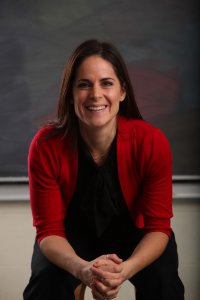 Family values
Family values
There are many other ways that Halpern has helped make a difference in the world, from her involvement with LEAF and the Canadian Association of Elizabeth Fry Societies to welcoming a homeless, at-risk youth into her family, who has essentially become her son. She continues to ask herself how each decision can have a positive impact and is encouraging her children to follow that example.
“One of the things I often say to my kids is that, more than school grades, athletics, or anything, what matters to me is that you’re kind and caring of other people. And I hope that rubs off on them. I hope they grow up to be kind and caring people.”
